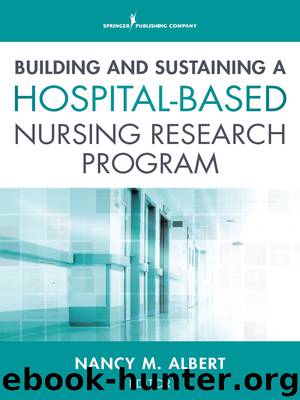Building and Sustaining a Hospital-Based Nursing Research Program by Dr. Albert Albert PhD CCNS CCRN NE-BC FAHA FCCM

Author:Dr. Albert Albert, PhD, CCNS, CCRN, NE-BC, FAHA, FCCM
Language: eng
Format: epub
Publisher: Springer Publishing Company, Inc.
Published: 2016-11-05T11:08:00+00:00
RESEARCH STUDY START-UP COMMUNICATION
Study start-up meetings are designed to give the PI and study team individualized education to prevent quality issues from occurring. Meetings are beneficial for new investigators and investigators who completed prior research but are using different study methods in the current research. Start-up meetings are necessary whenever the research design is a randomized controlled trial, as this design can be complex and investigators often need support when preparing for subject enrollment and data collection. The PI and study team will learn how to recognize and avoid common pitfalls, and can apply quality practices that ensure they adhere to IRB requirements. Study start-up meetings reduce the risk of adverse compliance observations that could occur during routine quality-monitoring activities and external audits. In many cases, the RQC can show investigators how to develop electronic files of patients who were approached and declined participation and those who met exclusion criteria, to minimize approaching a research subject more than one time. The RQC may discuss developing a document that ensures collection of data needed for a Consolidated Standards of Reporting Trials (CONSORT) diagram (www.consort-statement.org). Aggregate information collected will be used in a published report when editors require a figure that outlines study enrollment.
A regulatory binder checklist developed specifically for a nursing research program is a practical tool that can be used to facilitate study start-up discussions. This customizable checklist contains research compliance requirements and provides references to standard operating procedures, GCP guidelines, IRB requirements, and other applicable regulations. As can be seen in Table 6.1, the sections (dividers) on the Cleveland Clinic checklist include: binder organization, IRB documentation, approved study documents, research protocol, study staff responsibilities, data storage and security, and sponsor correspondence. The first section, binder organization, covers the specific order of binder content, including titles of labels for dividers. The approved study documents section encourages PIs to file IRB approved and stamped (if applicable) case report forms (CRFs). In the approved study documents section, approved study protocols should be filed, each listed with a version number. In this way, the study team will be better able to ensure current protocol adherence and be able to chronicle the protocol’s history of revisions after IRB approval. At the start-up meeting, the RQC will provide tips for protocol deviation prevention, such as filing amendments and receiving IRB approval before implementing a change to the protocol, and conducting all research procedures within the time frame specified in the protocol. Recommendations during the study start-up meeting should be tailored to the unique needs of each study. Table 6.2 provides study management best practices. The study staff responsibilities section is reserved for written communication, algorithms, study checklists, reminders, and other correspondence that the PI and other research team members require to promote continuity of research processes and standardization. The safe data storage and security section aims to protect the privacy and confidentiality of research subjects. The following paragraph provides specific questions that could promote or enhance data security measures. The last section, sponsor correspondence, is
Download
This site does not store any files on its server. We only index and link to content provided by other sites. Please contact the content providers to delete copyright contents if any and email us, we'll remove relevant links or contents immediately.
| Administration & Medicine Economics | Allied Health Professions |
| Basic Sciences | Dentistry |
| History | Medical Informatics |
| Medicine | Nursing |
| Pharmacology | Psychology |
| Research | Veterinary Medicine |
The Daughter's Return by The Daughter's Return(1795)
1610396766 (N) by Jo Ann Jenkins(1671)
Elizabeth Is Missing by Emma Healey(1662)
Economics and Financial Management for Nurses and Nurse Leaders, Third Edition by Susan J. Penner RN MN MPA DrPH CNL(1509)
McGraw-Hill Nurses Drug Handbook by Patricia Schull(1500)
Home. by Sarah Graham(1430)
Cherry Ames Boxed Set, Books 1 - 4 by Helen Wells(1430)
NCLEX-RN Prep Plus 2019 by Kaplan Nursing(1406)
The Language of Kindness by Christie Watson(1385)
Spiritual Midwifery by Ina May Gaskin(1373)
Cherry Ames, Student Nurse by Helen Wells(1371)
NCLEX-RN Prep 2019 by Kaplan Nursing(1358)
Cherry Ames Boxed Set, Books 5 - 8 by Helen Wells(1353)
Whoever Tells the Best Story Wins: How to Use Your Own Stories to Communicate with Power and Impact by Annette Simmons(1298)
Cracking the Nursing Interview by Jim Keogh(1295)
1476763445 by Liz Fenton(1263)
Global Diversity Management by Unknown(1249)
Getting Started with Arduino by Massimo Banzi(1230)
Dementia by June Andrews(1211)
